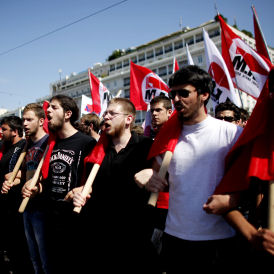Greece strikes in spending cuts protest
Police have responded with tear gas after demonstrators in Athens threw stones and bottles in protest against the terms of the latest Greek bailout.

As thousands rallied in Athens’ Syntagma Square, near the Parliament, hundreds of hooded youths threw stones and bottles as an initially peaceful protest turned violent.
On Twitter, Channel 4 News Foreign Correspondent Jonathan Rugman tweeted that some of the protesters were digging up cobblestones and throwing them at the police. He reported that running battles between demonstrators and police had broken out and that a Greek television satellite truck had been set ablaze.
Unions and workers in Greece are planning strikes and protests on Tuesday and Wednesday as the Government prepares to pass another wave of economic measures. The austerity measures are a condition of the country’s latest bailout from the IMF and EU.
Previous protests have ended in violence with demonstrators and police clashing.
Polls show three-quarters of Greece’s 11 million people oppose the austerity measures.
Greece’s conservative opposition has rejected EU leaders’ calls for national unity, forcing Prime Minister George Papandreou to rely on his slim parliamentary majority to push through the package.
The Greek PM narrowly survived a confidence vote earlier this month.
Without approval for the measures, the European Union and International Monetary Fund (IMF) say they will not disburse the fifth tranche of Greece’s 110bn euro bailout programme.
Britain’s only contribution to the multi-billion pound bailout will come through its membership of the IMF.
Prime Minister David Cameron said last week that he received assurances Britain would not contribute beyond that because the country is not part of the eurozone.
Many Greeks feel their country is ‘already broken’
“This week’s vote on the latest round of austerity measures has been described as a ‘make or break’ moment for Greece, but my sense is that many Greeks in Athens look around themselves and think their country is already broken,” writes Channel 4 News Foreign Affairs Correspondent Jonathan Rugman, in Athens.
“When I was here when this crisis began over a year ago, I felt a sense of national shame at the state the country had got itself into. I could see a version of that shame on the faces of the destitute in the soup kitchen yesterday. But for many Greeks, shame has been replaced by a growing sense that the acceptable limit of sacrifice has been reached, and that this is not their problem to solve.”
Read more in Jonathan Rugman’s blog: The view from Athens
People power
Athens needs the 12bn euros to pay its bills next month and avert the eurozone’s first sovereign default, which would send shockwaves through a jittery global financial system.
A parliamentary ballot on the framework austerity package is expected on Wednesday, with lawmakers then due to vote on Thursday on a bill containing specific steps to implement it.
At least three people in the ruling PASOK party have expressed doubts or outright opposition to the plan and have said they may vote against it.
Greece’s powerful unions have called a two-day national strike from Tuesday to ratchet up pressure on the Government.
Read more: How does Greece's bailout affect Britain?
ADEDY, the public sector union representing half a million civil servants, and its private sector equivalent GSEE – which represents two million workers – have called the two-day stoppage to coincide with the vote in Parliament.
Furious protesters have held regular rallies outside Parliament for weeks, chanting contemptuous slogans and waving their open hands at the shuttered windows, a highly offensive gesture in Greece.
Many companies, including the main electricity group which is slated for partial privatisation next year, have started rolling stoppages.